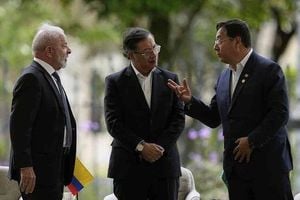Donald Trump’s latest round of bold claims has set off a fresh debate in international circles and on the campaign trail. On August 18, 2025, the former president announced from the White House that he had secured peace deals across the globe—remarkably, “without even mentioning the word ‘ceasefire.’” Just a day later, he upped the ante, revising his tally to seven wars ended, including the ongoing Ukraine conflict as his latest diplomatic ambition, according to reporting from multiple outlets including The Washington Post and MGDK.
But how much truth is there to these sweeping declarations? Let’s take a closer look at the seven conflicts Trump says he’s resolved, and just how much credit he can actually claim. The story, as it turns out, is far more nuanced than the headlines suggest.
Armenia and Azerbaijan: A Corridor, Not a Peace
In August, Armenia and Azerbaijan signed a deal in Washington, years after bloody clashes over Nagorno-Karabakh. While Trump hailed the agreement as a breakthrough, the reality is more complicated. The deal, known as the “Trump Route for International Peace and Prosperity,” established a transit corridor for Azerbaijan through Armenia to its Nakhchivan exclave. However, as MGDK reports, this is not a formal peace treaty. The core dispute over Nagorno-Karabakh remains unresolved, and both countries are still technically at war. Critics have called the agreement more of a geopolitical maneuver than a genuine peace settlement.
DRC and Rwanda: Fragile Peace in a Volatile Region
June saw the Democratic Republic of Congo and Rwanda sign a US-brokered peace agreement after decades of violence, much of it rooted in the aftermath of the Rwandan genocide. Millions have been displaced in this mineral-rich but conflict-ridden region. Trump’s role in bringing the parties to the table was widely publicized, yet the ink on the agreement was barely dry before Congo’s military accused Rwanda-backed rebels of launching new attacks. According to The Washington Post, the ceasefire is already under significant strain, casting doubt on the durability of the deal and highlighting the limits of outside intervention.
Israel and Iran: A Ceasefire, Not a Resolution
After a brief but brutal 12-day conflict this June, which included US strikes on Iranian nuclear sites, Trump claimed to have brokered a ceasefire between Israel and Iran. He posted triumphantly: “Officially, Iran will start the CEASEFIRE and, upon the 12th Hour, Israel will start the CEASEFIRE…” Yet, as analysts told MGDK, this is only a de facto ceasefire. Israel retains the right to strike again if Iran resumes nuclear activities, and the risk of renewed hostilities looms large. While Trump may deserve some credit for helping to halt the immediate violence, the underlying issues remain unresolved.
India and Pakistan: Ceasefire or Coincidence?
May brought another flare-up between India and Pakistan over the disputed region of Kashmir, following a terrorist attack and retaliatory Indian strikes. Trump was quick to claim he had secured a “full and immediate ceasefire” after a night of talks. Pakistan’s government praised his efforts and even floated a Nobel Prize nomination, but Indian officials downplayed his involvement. As one Indian official told MGDK, negotiations took place directly between the two militaries, not via US mediation. The situation remains tense, as evidenced by cross-border shelling in Banda, India, on May 15, 2025, reported by The Washington Post.
Cambodia and Thailand: Ceasefire Under Pressure
In July, border fighting between Cambodia and Thailand left dozens dead over five days before a ceasefire agreement was signed in Malaysia under US pressure. Trump took credit, posting on Truth Social: “I am calling the Acting Prime Minister of Thailand… to request a Ceasefire.” However, violations of the ceasefire followed almost immediately, with both sides accusing each other of renewed attacks. China has urged restraint, but the situation remains volatile and the ceasefire’s longevity is uncertain, according to MGDK.
Egypt and Ethiopia: A War That Never Happened
Perhaps the most curious entry on Trump’s list is the dispute between Egypt and Ethiopia over the Grand Ethiopian Renaissance Dam on the Nile. While tensions have run high, no actual war has broken out. Trump previously remarked, “If I were Egypt, I’d want the water in the Nile,” and later added that Egypt might “blow up the dam.” Ethiopia accused him of inciting conflict. Talks continue, but as MGDK points out, no formal agreement has been reached. The White House now concedes Trump “resolved” a conflict that hadn’t actually begun.
Serbia and Kosovo: Preventing a War That Wasn’t
Back in 2020, Trump did help broker an economic agreement between Serbia and Kosovo, two longtime rivals. However, he now claims he stopped a war before it started. “Serbia, Kosovo was going to go at it… I said you go at it, there’s no trade with the United States,” Trump recounted in June. While tensions were certainly rising, there was no imminent armed conflict, making his claim largely symbolic, as noted by MGDK.
Ukraine: The Unfinished Quest
Trump’s latest ambition is to end the ongoing war in Ukraine. He has been pushing for talks to resolve Russia’s invasion, but as of August 2025, no real progress has been made. In fact, the conflict has only escalated. Trump himself admitted, “I thought it would be easier,” reflecting the immense challenges involved. According to The Washington Post, his role in peace efforts remains highly contested and, so far, purely aspirational.
Peace Prize or Political Posturing?
Trump’s string of peace claims comes amid speculation about a 2025 Nobel Peace Prize nomination. Supporters see him as a decisive dealmaker, while critics argue he’s inflating his role and claiming credit for fragile, incomplete, or even nonexistent agreements. Many of the deals are tenuous, symbolic, or based on ongoing negotiations that predate his involvement. Still, Trump’s narrative has captured headlines, and his supporters point to his willingness to engage with adversaries as evidence of his unique diplomatic approach.
In sum, Trump claims to have resolved conflicts in seven regions: Armenia-Azerbaijan, DRC-Rwanda, Israel-Iran, India-Pakistan, Cambodia-Thailand, Egypt-Ethiopia, and Serbia-Kosovo—with Ukraine as his next target. Some agreements have delivered tangible, if fragile, progress. Others are more symbolic or contested. Whether he deserves a Peace Prize or simply more headlines, one thing is clear: Trump’s approach to global peacemaking remains as controversial and headline-grabbing as ever.
The world will be watching to see if any of these ceasefires and agreements stand the test of time—or if they will be remembered as fleeting moments in a complicated era of diplomacy.



